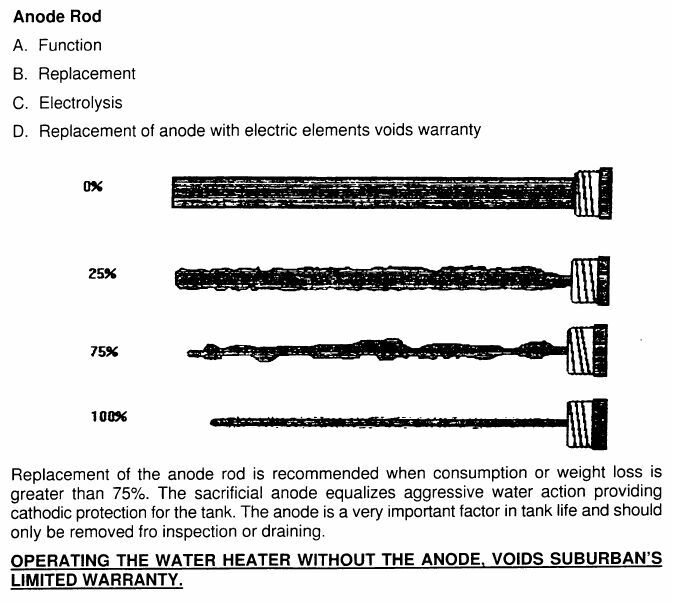Desert_Captain
Jan 25, 2018Explorer III
Is it time to change you water heater anode?
This is one of those preventative maintenance chores that like changing batteries in your smoke detectors, that can easily be overlooked. If you can't remember when it was last changed or simply don't know... it is time. At the RV Show in Quartzsite last week I found a box of generic water heater anodes selling for $10 a piece. These are compatible with all Suburban water heaters and almost half price vs CW.
It takes just a few minutes to drain, flush and change the anode but doing so about once a year will save your water heater tank from serious corrosion that can lead to a premature failure. Here's how:
Turn off the water heater - both electric and gas and shut off your water pump and or disconnect from the city water source. Release the pressure valve, yes you may get a bit wet so stand clear. When the pressure is fully released you can now unscrew and remove the old anode.
To get it out you will need a 15/16ths socket, which can be hard to find unless... you happen to have a large "X" lug wrench in which case you will find the largest end to be a perfect fit. Unscrew and discard the anode {it should show significant corrosion which just means it was doing its job - giving its life so that your tank might live and heat on} letting the tank drain completely.
You will probably see a lot of white debris which is the residue from the old dissolving anode element. Blow out the tank with a garden hose to dislodge the remaining debris. Letting it run under pressure and then allowing it to drain may take a few cycles depending on how long that anode has been in there and how much has been eaten away.
Close the pressure relief valve. Now simply install the new anode make sure the threads are smooth and that it seats snugly. Turn on your water source {fresh water pump or city water} and allow the tank to refill. Open your hot water faucets one at a time to bleed the air out and to make sure they are flowing. Sometimes the old anode debris can clog your aerators, blocking the hot water flow {don't ask me how I learned this and thanks to the folks here on the Forum who explained the problem and solution to me a couple of years ago}.
Turn on the gas and or electric and in no time you should have restored the flow of steaming hot water to your taps. You should now be good to go for at least another year.
:C
It takes just a few minutes to drain, flush and change the anode but doing so about once a year will save your water heater tank from serious corrosion that can lead to a premature failure. Here's how:
Turn off the water heater - both electric and gas and shut off your water pump and or disconnect from the city water source. Release the pressure valve, yes you may get a bit wet so stand clear. When the pressure is fully released you can now unscrew and remove the old anode.
To get it out you will need a 15/16ths socket, which can be hard to find unless... you happen to have a large "X" lug wrench in which case you will find the largest end to be a perfect fit. Unscrew and discard the anode {it should show significant corrosion which just means it was doing its job - giving its life so that your tank might live and heat on} letting the tank drain completely.
You will probably see a lot of white debris which is the residue from the old dissolving anode element. Blow out the tank with a garden hose to dislodge the remaining debris. Letting it run under pressure and then allowing it to drain may take a few cycles depending on how long that anode has been in there and how much has been eaten away.
Close the pressure relief valve. Now simply install the new anode make sure the threads are smooth and that it seats snugly. Turn on your water source {fresh water pump or city water} and allow the tank to refill. Open your hot water faucets one at a time to bleed the air out and to make sure they are flowing. Sometimes the old anode debris can clog your aerators, blocking the hot water flow {don't ask me how I learned this and thanks to the folks here on the Forum who explained the problem and solution to me a couple of years ago}.
Turn on the gas and or electric and in no time you should have restored the flow of steaming hot water to your taps. You should now be good to go for at least another year.
:C
